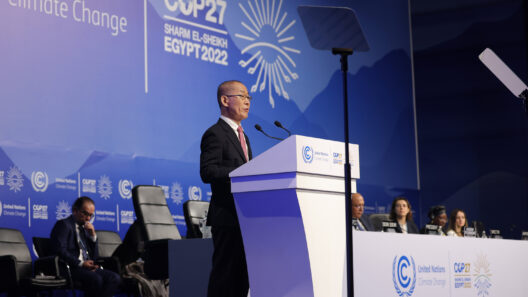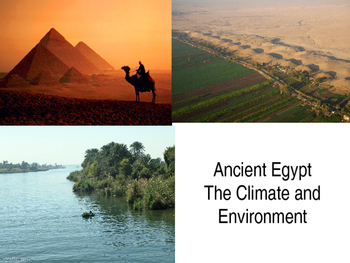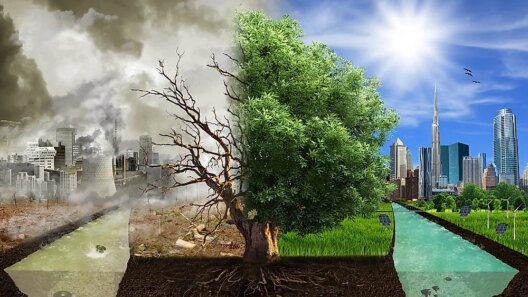The climate crisis is upon us, a tempest brewing not just in the atmosphere but also within our institutions. The narrative of oil companies often paints a picture of crucial pivots: from industrious innovators to reluctant participants in the fight against climate change. But buried within corporate archives and dusty documents lies a more complex tale—one where oil company researchers, armed with the tools of science, foresaw the specter of global warming long before it became a household concern.
In the heady days of the 1970s, fossil fuel companies were not merely extracting resources; they were engaged in a parallel inquiry, investigating the impacts of their actions on the planet. These corporations employed brilliant scientists, equipped with advanced technology and an insatiable curiosity, to dissect the delicate interplay between their products and the environment. This period marks a turning point, a moment when knowledge began to diverge from ethics.
As gases such as carbon dioxide infiltrated the atmosphere, researchers at these companies grasped the dire implications. Their studies used intricate climate models—early harbingers of what would soon emerge as a consensus in the global scientific community. However, rather than sounding the alarm, these findings were too often shrouded in silence, shielded by corporate interests and a commitment to profit. In some cases, they actively sought to obfuscate this knowledge, fostering an illusion of uncertainty about climate science.
By the 1980s, a more refined understanding of climate change began to crystallize among these researchers. They posed questions about the future of the planet, contemplating what a warmer world might entail. The metaphorical canary in the coal mine, the implications of their findings were clear to those who chose to look. Spiraling temperatures, rising sea levels, and shifting weather patterns were not just projections; they were warnings echoing through the halls of power. Yet, the inner dialogues of these companies reflected a dissonance—a stark contrast between science and business as usual.
This conundrum of knowledge versus action encapsulates a pervasive theme: the clash between short-term gain and long-term survival. It raises the unsettling prospect that while researchers were predicting environmental catastrophe, decision-makers were fostering an environment ripe for continued extraction and consumption. In essence, they were cultivating a garden of denial, planting seeds of misinformation to shield themselves from accountability.
The ramifications of this negligence extend far beyond corporate ethics. As studies emerged predicting a problematic climate future, the greater implications began to unfurl. Think of it as a dam holding back an immense torrent. Each study suggested a crack, a pressure point where truth could seep through. Yet, the dam held firm, as executives and stakeholders focused on immediate returns rather than the long-term implications of climate destabilization.
In this theater of absurdity, the public remained unaware of the revelations unfolding behind closed doors. The fossil fuel industry wielded its influence to shape public discourse, pouring resources into campaigns aimed at diminishing the severity of climate change. They funded pseudo-scientific studies that created a fog of doubt around what was known and what was not. The societal cost of this disinformation campaign is immeasurable; it has delayed crucial interventions and eroded trust in scientific institutions.
The irony is stark: while oil companies invested heavily in research to understand climate dynamics, they simultaneously funded efforts to propagate confusion and resistance to necessary action. Herein lies an essential paradox—recognized by those within the industry yet systematically ignored: knowledge without action is a recipe for calamity.
As the 21st century dawned, the revelations of past research began to resurface, igniting a renewed interest in this corporate duality. Investigative journalists and environmental advocates poured over troves of documents, unearthing studies that revealed the meticulous work conducted by these companies. Their findings are now catalysts for discussion, clarifying the negligence inherent in their decisions. The juxtaposition of scientific insight and corporate silence forms a part of the broader discourse on accountability and responsibility.
Now, we stand at the precipice, in a world where the implications of delayed action are becoming increasingly evident. Extreme weather events, catastrophic fires, and devastating floods are fingerprints of climate change—reminders of an industry’s betrayal of both scientific understanding and societal obligation. The narrative is shifting; the repercussions of historical negligence become harder to ignore. We can no longer reduce climate change to mere statistics on a graph; it is an indelible reality affecting lives across the globe.
In light of these revelations, the question persists: What does accountability look like for those who foresaw the storm but chose to shield themselves from it? As lawsuits mount and public sentiment shifts, pressure mounts for the industry to reckon with its past and embark on a path to redemption. The metaphorical playing field has changed; what was once a concerted effort to obscure the truth now requires a commitment to transparency and genuine action.
The narrative of oil companies in the climate crisis illustrates the precarious nature of foresight when it collides with corporate ethics. The rich tapestry of research, once obscured by the mists of denial, offers a sobering reminder that the future of the planet pivots on the choices made today. The path forward must integrate lessons from the past with an urgency that reflects the scale of the climate crisis, ensuring that knowledge translates into meaningful action. It is a clarion call for accountability, laying the groundwork for a sustainable future. In this fragile world, one cannot help but wonder: will we heed the warnings, or will we continue to dance on the precipice?






